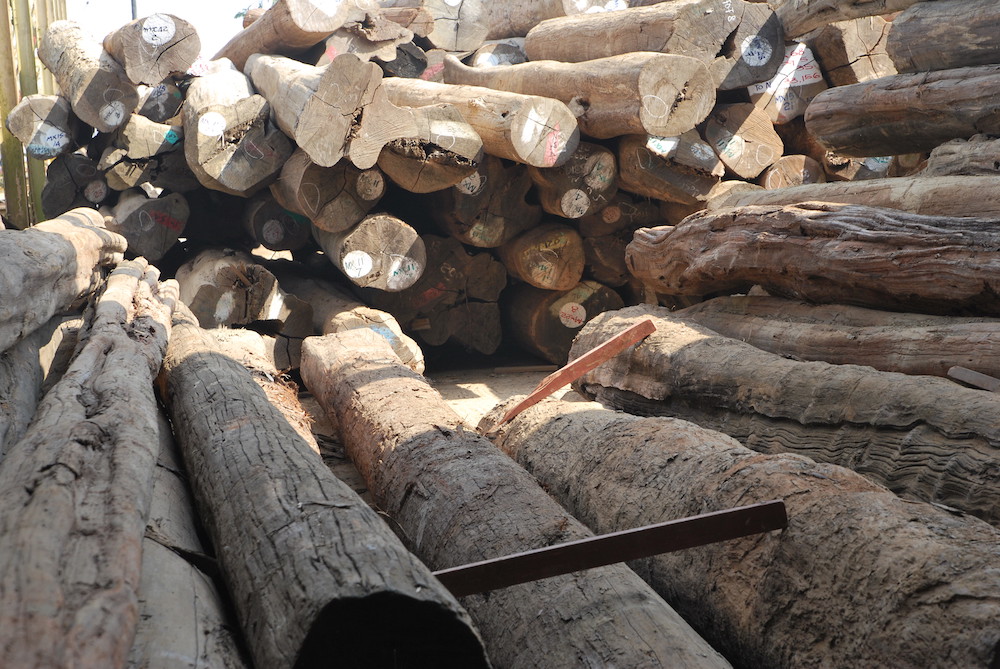EXCLUSIVE: Myanmar teak trafficked through Italy
Despite EU laws, the Environmental Investigation Agency reveals that Myanmar teak is still moving through Europe and being used in the yachting industry…
An undercover investigation by the Environmental Investigation Agency (EIA) has exposed how a number of Italian companies have continued to profit from the sale of valuable timber from Myanmar. The same report also indicates that other European nations have successfully cracked down on the export and use of timber from Myanmar, especially teak where the superyacht industry is concerned. European authorities agree with the EIA that the importation of Myanmar timber to Italy is in violation of the EU Timber Regulation (EUTR).
The investigation highlights that trade has continued between Italy and Myanmar since the military coup of February 2021 and raises serious questions about how the Italian and European authorities plan to impose sanctions against the importation of Myanmar’s timber into Italy. The investigation, which lasted 18 months from early 2020, has identified a total of 27 Italian timber traders importing teak into the EU from Myanmar despite clear regulations, in the form of the EUTR, which prohibit such imports.
“The main point from the report is that Italy remains a major landing point for Myanmar teak despite the common position amongst EU member authorities that this type of wood cannot comply with the EUTR,” explains Alec Dawson, forests campaigner at the EIA. “Within this, there are a few other points. Firstly, the amount of timber going into Italy has increased, while it has decreased in other parts of Europe like Germany and The Netherlands, at least by way of direct shipments. The reduction in importations for these nations corresponds with the enforcement of the law in those other countries, which has led to a shift in trade towards Italy where enforcement has not been as strong.”
Dawson further explains that there is direct evidence that at least some of the timber is going through Italy and ending up in other yacht-building nations, such as Germany and the Netherlands. For instance, some shipments that were analysed for the purposes of the investigation were declared as heading to either Germany or The Netherlands, with some small companies seemingly only in existence to facilitate the movement of illegal teak into these nations. It must be said, however, that the report does not draw any direct links between yachting businesses in Germany and The Netherlands.
“Although the sanctions were imposed in June, we’re not sure whether or not they have been applied in Italy. There is a world in which the timber trade stopped following the EU sanctions, but we haven’t seen any evidence to suggest this to date and when we contacted the various companies involved, none of them were willing to say that they would stop trading with Myanmar,” continues Dawson. “We expect that, unfortunately, they will keep trying to import the timber.”
It is suggested within the report that, especially where teak is concerned, the marine sector has a big part to play in its continued trade: “Many of the Myanmar teak traders are found in Europe and the US, [they are] keen to buy this highly valued timber product, especially for its use in the marine sector, in particular as decking for yachts.”
“A large amount of the teak from Myanmar’s natural forests imported into Italy is destined for the luxury yachts sector, the most expensive of which cost hundreds of millions of dollars. The importance of using teak from natural forests compared to plantations was highlighted by a representative of an Italian importer, who said ‘No, no, no, no (laughing), are you kidding? You couldn’t even use it [plantation teak] for the cruise ships.’ The reason cited is the look of teak from natural forests as well as their durability,” explains the report.
Fortunately for superyacht builders, the legal responsibility for the importation lies with the original importer of the teak and, therefore, shipyards are able to avoid any legal recourse, which no doubt explains why some yards continue to purchase and use the teak. However, being clear of legal responsibility has no bearing on moral responsibility. The truth of the matter remains that, if the yachting markets stopped demanding the teak, the importers would stop supplying it and, by proxy, they would stop funding a repressive and genocidal military junta.
In recent years the superyacht industry has made a great deal of noise about sustainability in all forms, whether that is supporting the environment through various initiatives, the development of greener technologies, or a greater focus on diversity and inclusion. There are, however, factions within the yachting community that have been willing to speak out about the prevalence of greenwashing and its ability to hide all manner of sins. Some would argue, however (myself included), that greenwashing as a term doesn’t feel anywhere strong enough to account for the fact that the superyacht industry, is indirectly helping to fund a repressive military junta. At what point does client demand and a willingness on the part of industry stakeholders to please at all costs drift into insanity?
“I would say that blood diamonds are an appropriate analogy for the illegal importation of teak that we would be happy to apply. The importation of teak from Myanmar is like any other blood or conflict resource. This resource is coming from a warzone and the military is profiting from it,” continues Dawson. This same regime faces genocide charges at a United Nations court for its soldiers’ atrocities against the Rohingya people.
At least part of the issue is that, where fines have been levied against businesses importing teak from Myanmar, they have been minuscule in comparison with the profits made. “That is certainly an issue. The fines are extremely low in comparison to the value of the timber being traded and, given the value of the end product, the amount they are willing to pay could probably dwarf the value of the fines. Enforcement has been much more successful where authorities have used injunctions to block imports and forced companies to send timber back where it came from. This has happened in places like Germany and Sweden, but it is only effective if people in those places can’t just source timber through Italy,” says Dawson.
The report lays out a number of recommendations for dealing with the trade of illegal teak through Italy:
To timber traders in Italy and elsewhere
• Immediately cease sourcing Myanmar timber
To Italian authorities
• Ensure the sanctions on MTE and FPJVC are being complied with by ensuring no Myanmar timber is being traded into Italy, including from third countries (e.g. Singapore)
• Use all available powers to enforce the EUTR, including maximum fines of up to €1 million for violations of the regulation’s due diligence provisions
• Change the Italian implementing legislation if necessary to enable better law enforcement
• Share information with the Financial Action Task Force to ensure financial crimes can be fully investigated (Editor’s note: the report also highlighted how the teak trade related to tax evasion)
To other competent authorities in the EU and UK
• Investigate whether companies in relevant member states have been complicit in violations of the EUTR (and UK Timber Regulation (UKTR)
To European Commission
• Use this information to investigate failures to enforce any laws and launch a case against any countries, including Italy, that are failing to enforce the EUTR70
To international community
• Use this information and all available tools, including sanctions, to investigate how the timber sector is financially benefiting the military and take action against companies that are facilitating the atrocities of the junta.
In addition to the EIA’s recommendations, it should be added that certain businesses, while not legally culpable, bear a responsibility to stop using Myanmar teak, whether or not it has been requested by the client. This must become an industry-wide imposition, not a sustainable alternative provided by certain builders.
Photo credit: Environmental Investigation Agency
NEW: Sign up for SuperyachtNewsweek!
Get the latest weekly news, in-depth reports, intelligence, and strategic insights, delivered directly from The Superyacht Group's editors and market analysts.
Stay at the forefront of the superyacht industry with SuperyachtNewsweek
Click here to become part of The Superyacht Group community, and join us in our mission to make this industry accessible to all, and prosperous for the long-term. We are offering access to the superyacht industry’s most comprehensive and longstanding archive of business-critical information, as well as a comprehensive, real-time superyacht fleet database, for just £10 per month, because we are One Industry with One Mission. Sign up here.
Related news
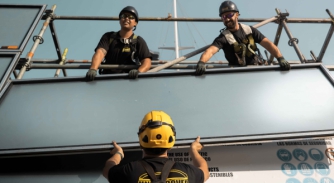
Sustainable scaffolding in Astilleros De Mallorca
Are Undercover Solutions providing an obvious answer to a glaring issue?
Technology
.jpg)
Hill Robinson celebrates 20 years
Over the past two decades Hill Robinson has developed to offer a plethora of services for yacht owners and clients across the world
Business
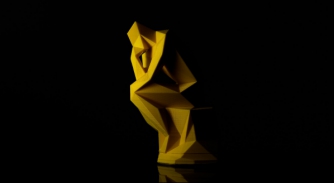
The human cost
Are automation and craftsmanship diametrically opposed? How might this impact the future of the superyacht industry?
Business
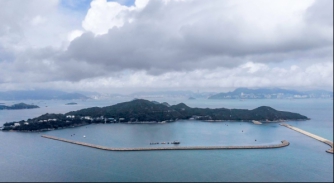
Delta Marina update
Local Marine Department starts issuing approvals for moorings at the new facility on Hong Kong’s Hei Ling Chau
Business
.jpg)
It’s not what you know, it’s who you know
A lack of meritocracy is stopping the industry from evolving
Business
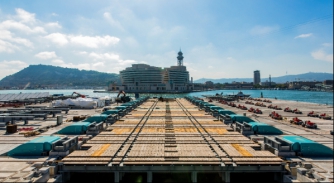
MB92 Group's Middle Eastern strategy
Following the appointment of a business development consultant for the Middle East, we explore the wider strategy
Business
Related news
Hill Robinson celebrates 20 years
4 years ago
The human cost
4 years ago
Delta Marina update
4 years ago
It’s not what you know, it’s who you know
4 years ago
MB92 Group's Middle Eastern strategy
5 years ago
NEW: Sign up for
SuperyachtNewsweek!
Get the latest weekly news, in-depth reports, intelligence, and strategic insights, delivered directly from The Superyacht Group's editors and market analysts.
Stay at the forefront of the superyacht industry with SuperyachtNewsweek


